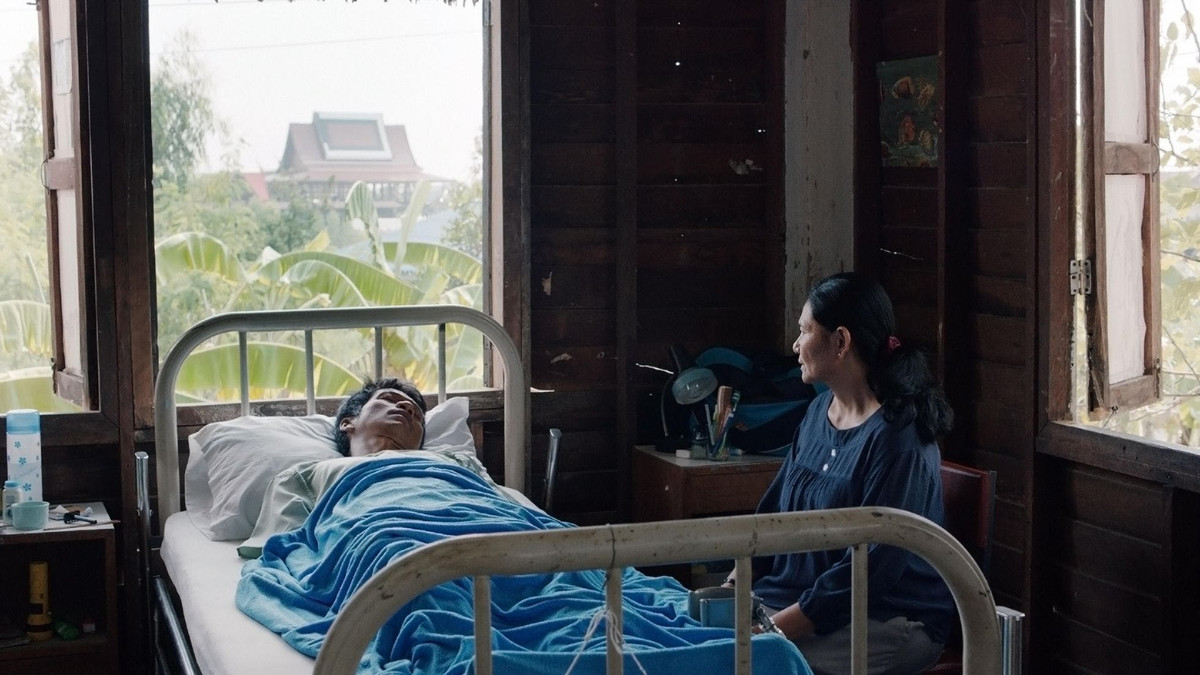Thai director Apichatpong Weerasethakul's eighth feature length movie, Cemetery of Splendor, is by many measures an expansive film. Its temporal scope often stretches beyond the immediate, visual space-time of what is happening within any given frame, as some of the characters often leave their bodies and drift into timelines that are not available to the eye of the viewer. The film's representation of history is multivalent, which we see most clearly through the hospital where dozens of soldiers lie asleep due to an unexplainable ailment. We discover, in pieces, that the hospital used to be an elementary school and, before that, a cemetery for dead kings. According to two princesses who appear before Jen (Jenjira Pongpas), a volunteer woman at the hospital, the soldiers remain asleep because the dead kings are using their spirits to wage unfinished wars.
Almost as soon as the film begins, one gets the feeling that the characters in the film are all being propelled by forces too large and too ancient to be properly apprehended. The soldiers wake up as suddenly as they fall back asleep. The women who tend to the soldiers, especially Jen, interface frequently with the soldiers' spirits in search of answers, but receive nothing of the sort. And, by the end of the film, the thin line that separates reality from dream, history from myth disappears all together. When Jen tells Itt (Banlop Lomnoi), the soldier she's been looking after, that she believes she is dreaming and wants to wake up, Itt tells her that all she has to do is "open your eyes wide." The film ends with a surprising and uncharacteristic medium close-up shot (save this scene, nearly the entire film is shot from a wary distance) of Jen's petrified face, her eyes wide open as she strains to wake up from her reality.
It becomes fairly clear that something is being said of Thailand's tumultuous contemporary political moment, but the film is riddled with so many culturally specific references (lake shrines, twin princesses, warring kingdoms, clairvoyants, etc.) that a viewer uninitiated in recent Thai history might misperceive the surrealism of the film as simply a stylistic choice. In reality, the narrative is steeped in political allegory and constitutes, perhaps, Weerasethakul's most flagrantly political film.
Released just a few days short of a year since Thailand's 2014 military coup d'état, Cemetery of Splendor doesn't shy away from taking hard jabs at the military junta that has instituted martial law, banned political meetings, harassed anti-regime dissidents, and repealed parts of the country's constitution since its ascent. The elements of the film that might appear to Western viewers as occult and surreal, and therefore opaque, gesture towards the very real, material violence of Thailand's ruling National Council for Peace and Order (NCPO). Weerasethakul's manipulation of the viewer's sense of place and time, the viewer's orientation of reality, through the surreal and the occult accomplishes something political realism could not. The artful manipulation speaks to the disordering psychological experience of living in a nation essentially at war with itself--the way in which something as basic as a person's identification with her own country, her own people, and her own history can turn into a bewildering sense of loss. It is in this realm of loss and misidentification that the laden enigma of the last scene gathers a powerful logic. The reality Jen is situated in is so surreal to her that she believes it must all be a dream and that it's time for her to wake up.
This bewildering sense of loss and misidentification is pointedly explored through the dissolution of the body, which operates as perhaps the most important motif in the film. The soldiers who lie motionless in their gurneys have basically lost control of their bodies—their spirits, enlisted by dead kings, fighting endless wars in a bygone world. Jen's right leg is ten centimeters shorter than her left, leaving her with a heavy limp, for which she uses a cane and an array of herbal ointments. Saleswomen are shown peddling hand lotions and creams to village women, fumbling through a quasi-feminist sales pitch about the inner beauty of all women. We're told that Jen's American husband has arthritis and early symptoms of Alzheimer's. The hospital workers and volunteers are seen meditating through a form of yoga, alleviating themselves of cancer, hypertension, diabetes, or AIDS.
The film's preoccupation with the body's integrity works, on one level, to show a Thailand that has become culturally hybridized through its induction into the global economic order. In one scene, Jen and Itt worry about the potentially dangerous cholesterol content in a bottle of Pepsi, a strong symbol of the far-reaching impacts of Western multinationals, while, in another, Jen is shown offering animal figurines to the twin princesses of a local lake shrine for her family's health. On a different level, the ailing body works as the privileged symbol of the dysfunctions of a body politic. Again, the soldiers' mysterious condition, which keeps them confined to their beds in the "real" world and fighting in wars in the "dream" world, strips these men not only of their physical autonomy, but also of their futures. These soldiers are literally trapped between the militarism of the present and the warring kingdoms of the past, unable to seek out a future outside of violent battle. Sitting under a gazebo in the park, Itt admits to Jen that he would like to quit the army and start a business selling mooncakes because he sees no future where he is now. Later, Jen tells Itt that he'll live a long life and that he should save himself for a future better than the one they are presumably hurtling toward.
It's satisfying to make the connection between Weerasethakul's early training as an architect and the palatial architecture of emotion and history Weerasethakul is able to construct in Cemetery of Splendor. Watching the film, we get the sense that we're slowly moving through a place of levels, hidden rooms, and resplendent monuments—the halls filled with everyone who has ever lived there. The anxieties we might feel wandering through this massive, unfamiliar space settle as we're filled with awe by the sheer openness, the generous space of possibility, we're led to by the film's closing. We're not shown if Jen ever wakes up from reality, but at least we see that she's disavowed it.
Skip to content

02.20.2018 — Longform
Dreaming of Reality
Escaping the militarism of the present and the warring kingdoms of the past in A Cemetery of Splendor
Justin Hong
